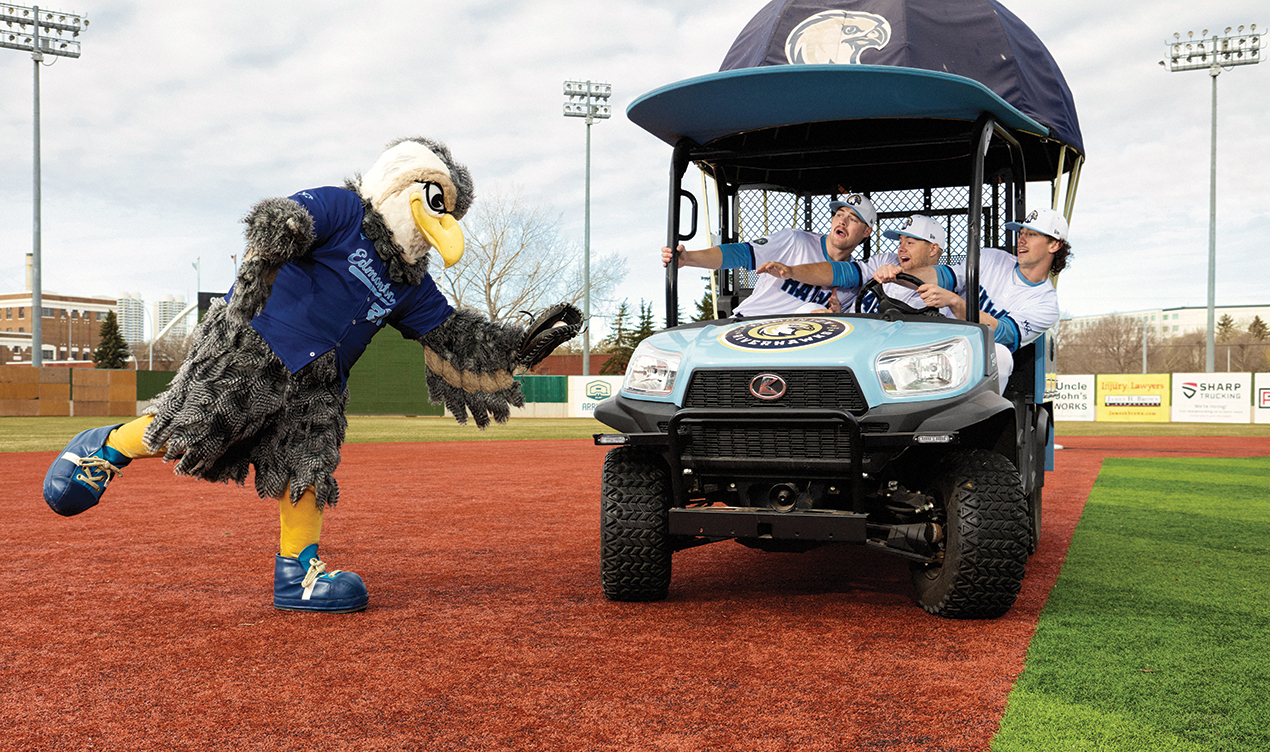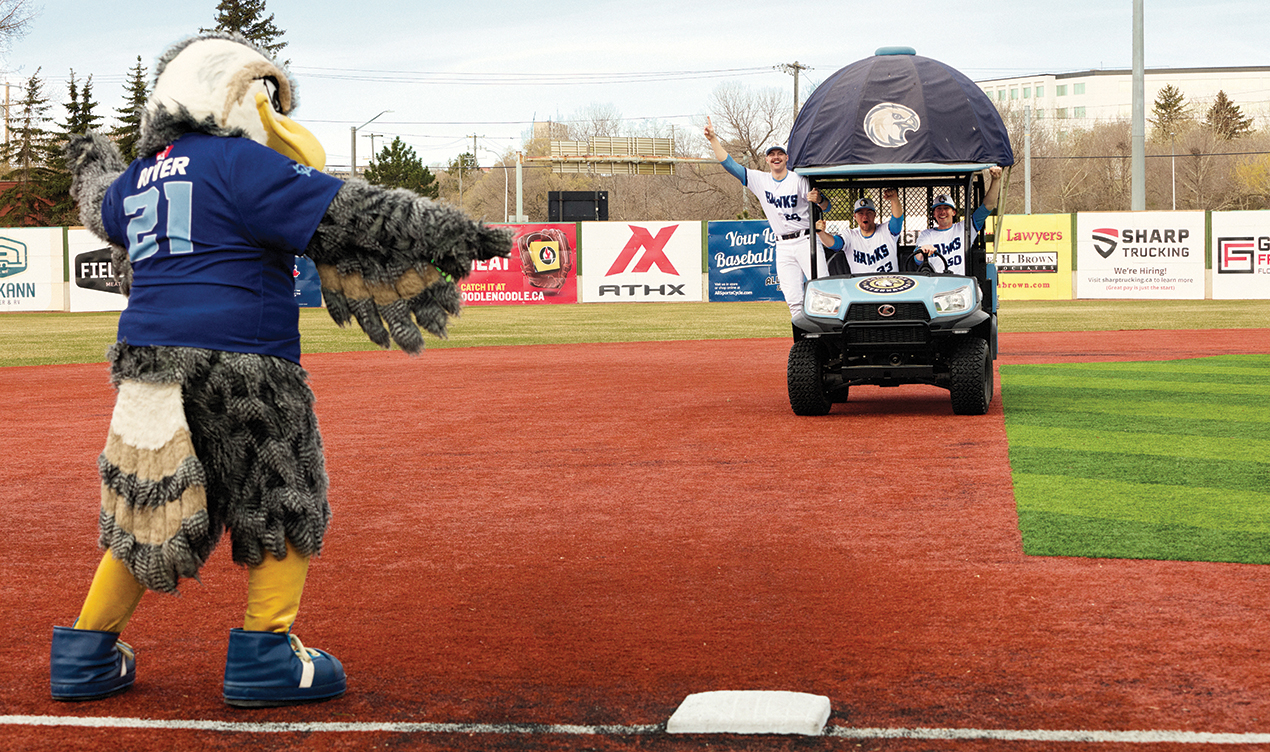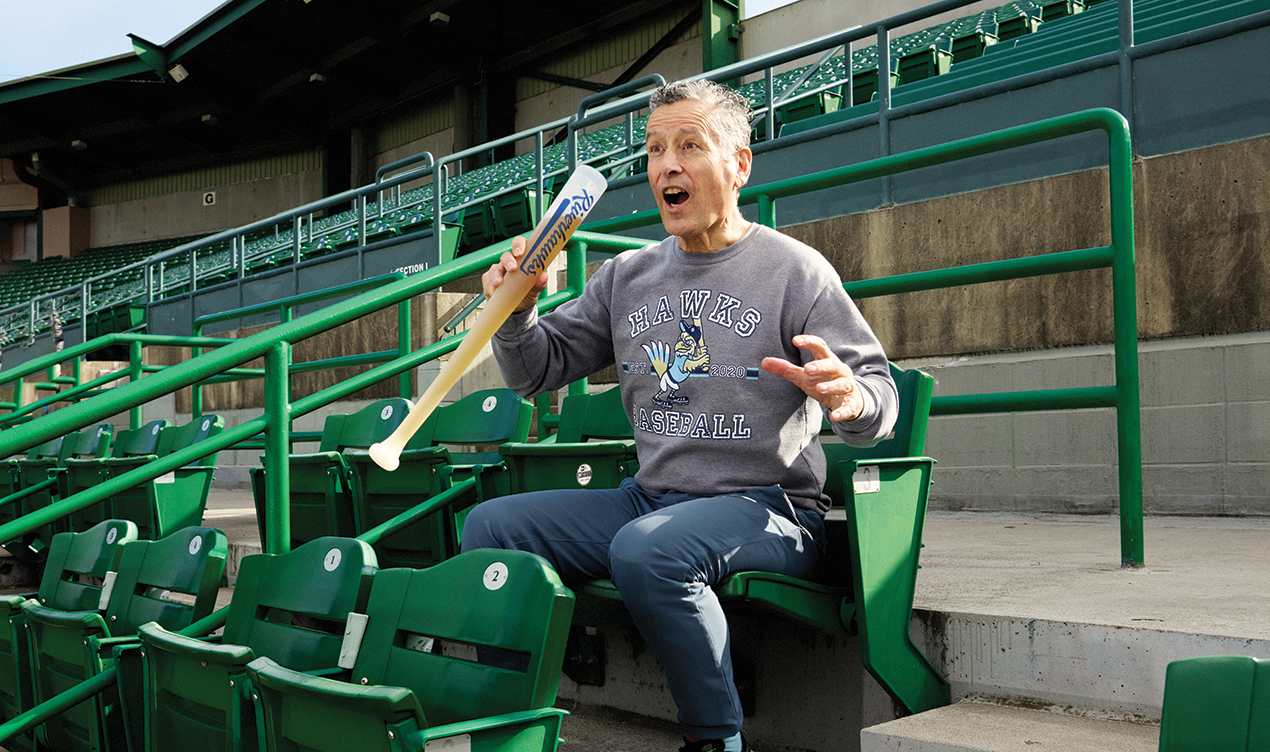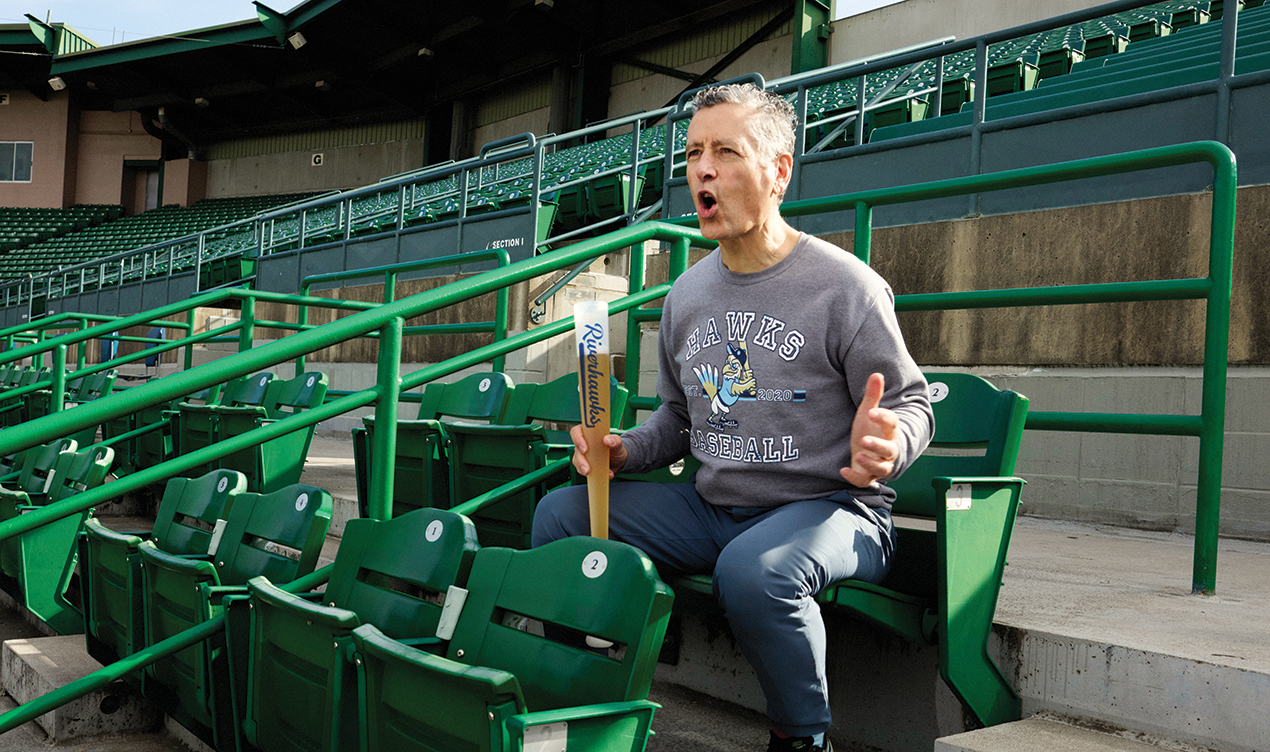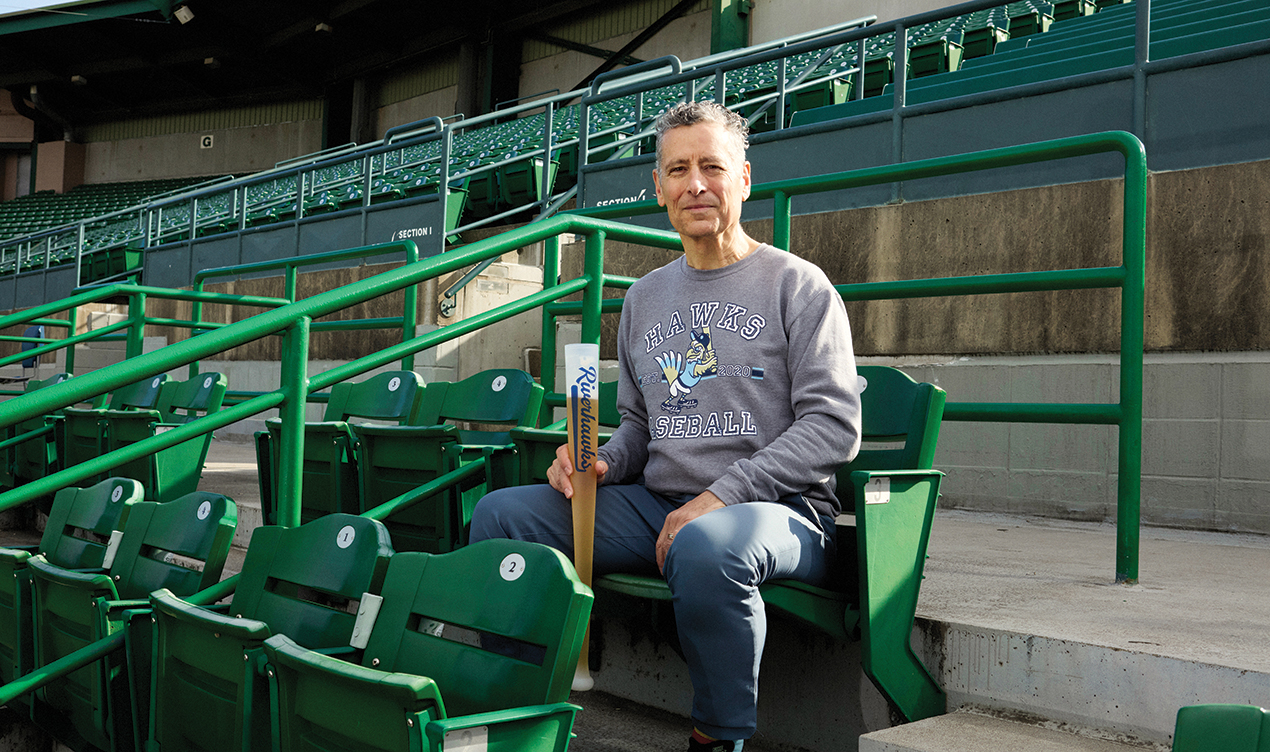After the Edmonton Trappers left the city at the conclusion of the 2004 Pacific Coast League season, we lost professional baseball that was just one step away from the Major Leagues. And the stadium now known as Re/Max Field became a white elephant in the river valley.
It was a fabulous park for baseball, offering postcard views of the city. Walterdale Bridges both past and present highlighted the look towards right field. It was a park with unique characteristics, including the “Other Green Monster,” the 30-foot tall fence that sits at the edge of centre field, 420 feet from home plate.
The problem was, after the Trappers, it didn’t have a home team that could stick. There were the Cracker-Cats and the Capitals. Both didn’t last.
But Randy Gregg, the former Oilers defenceman with five Cup rings, had an idea. He wanted to bring baseball back in a way that would last. He had 30 friends, family and acquaintances from the community on board. In 2020, they formed Baseball Edmonton, a group whose goal wasn’t really to make big wads of money, but to make the sport sustainable.
The Edmonton Prospects of the Western Canada Baseball League had played in Re/Max Field since 2012, but weren’t drawing huge crowds. It was frustrating for the City, which owns the stadium. Gregg recalls a meeting he had with then-mayor Don Iveson, whom Gregg says warned him that the City would not continue to operate a stadium with attendances of 1,500 people a night. It wasn’t worth it — and, if that was the case, demolishing this gem of a ballpark might have to be the nuclear option.
But, Gregg said that the then-mayor was sold on a vision for a team that could draw at least 3,000 a night in the 9,200-seat venue.
“Not everybody’s played in Major League Baseball, but everybody’s played scrub when they were young in school, or played with friends out in the park,” says Gregg. “People are aware of the game of baseball. You think back to years ago: You played hockey in the winter, you played baseball in the summer. So, I think there’s a recognition that this is a game that should be part of our sporting environment here in Edmonton.”
Gregg’s group won the bid to lease Re/Max, and the Prospects moved out; the team is set to move into a new Spruce Grove home. The Riverhawks were born, and in 2021 began play in the West Coast League. It’s a league that attracts top collegiate players from schools in Canada and the United States. They need places where they can play during the summer months, and they use wood bats like the pros do. Hence, why collegiate circuits like the WCL are nicknamed “wood bat leagues.”
In 2023, the team set a WCL record, with 104,748 fans. With 27 home dates, that’s an average of 3,880. That included a “Take Me Out to the Ballgame” school-day promotion, which saw 6,700 Edmonton and area students come out to see the Riverhawks. This year, the ticket sales for the school-day event, on June 12, have already been cut off, as 7,000 tickets for kids have already been spoken for.
Gregg makes no bones about why it works: It’s the ticket prices. Outside of specialty seating, the rest of the park is general admission. All of the GA tickets are $20 each. There are no complicated seating charts. If you want to go to the ball game, you just pick up and head to the park. My son has met his friends from his baseball team at Riverhawks games. They know to meet at a certain section, they go off and enjoy the evening, the parents get together, find some seats and have a few beers. It’s going out to a sporting event, made easy.
“One strategy we hold dearly is that it has to affordable,” says Gregg. “After our first year, we had $20 tickets, and people would come up to us and say, ‘you know, you’re very popular, you could increase your ticket price.’ And we’d say, ‘we know we can, but we’re not going to.’ Why? Because I don’t care about you or me, I care about that young family that maybe has some financial issues, but still wants to bring the kids out to an outdoor event that’s exciting. We have a $9 hamburger for the person who wants a $9 hamburger, but we also have a $3 hotdog.
“Growing up in Edmonton, my family came from Inglewood, we didn’t have a lot. I think it’s important not to only worry about the people who can buy suites and $300 tickets, but maybe to think about the person to whom $20 is a big cost, and they can’t do it very often.”
Gregg says the ownership group has a mandate that the team is about making baseball sustainable in Edmonton, for the long term.
“We don’t think about the bottom line, but what’s best for the community. We think about what our kids would want, and what our grandkids would want. If we keep that in mind, I think we’ll make good decisions… We’re not the Toronto Blue Jays or the New York Yankees, we never will be. We have to do some extra things.”
One of those “extra things” is the collegiate program, which provides a chance for young Canadians to play ball, possibly even in the WCL. More than 700 Canadians are playing baseball in universities and colleges in the United States. It’s not a sport that’s traditionally been offered by schools here. Neither MacEwan nor the University of Alberta have baseball programs, though the sport is gaining traction at the University of Calgary and in Lethbridge. Some of the British Columbia schools have baseball teams.
But, for the most part, if an Edmonton kid wanted to pursue baseball in college or university, the only choice was to think about the United States. But the Riverhawks’ collegiate team acts as a catch-all, of sorts. Those pursuing post-secondary educations in the Edmonton area can play their ball with the Edmonton Collegiate Hawks, which competes against other post-secondary teams in Western Canada.
Gregg says the goal of the Riverhawks is to see more Edmonton baseball prospects choose to stay in Edmonton.
And that leads us to three Edmonton products who will feature in the WCL Riverhawks’ pitching staff this season. Halen Knoll pitched for a year in the United States. Last year, he was named the top pitcher in the WCL. After the WCL season ends, he’ll head to Ontario to play in the semipro Inter-County Baseball League.
“This whole program, not only the Riverhawks, but the Edmonton collegiate program building into the Riverhawks, it’s literally taken me everywhere where I’ve wanted to be, and where I want to go in the future,” says Knoll. “Just seeing the amount of fans who are coming out to these games, it’s very clear that Edmonton can be a baseball town. It’s a sport everyone wants to watch, especially in the summer.”
Then there are the Yusypchuk brothers. Andrew pitches at Southern Illinois University, and will return home to spend the summer with the Riverhawks. His brother, Michael, is regarded as one of the top pitching prospects in Canada. He’s already committed to Missouri State, but he’s currently playing in Okotoks with the Dawgs, one of the top academy teams in Canada. Michael has played for Canada’s U-18 team and no-hit Peru through six innings in international competition.
Michael will play with the Riverhawks before he ever faces an NCAA batter.
These are just a few examples of how the baseball talent Alberta is producing might be the best-kept secret in this province’s sports scene.
“The talent has got significantly better over the years,” says Knoll. “With baseball, we’re shifting towards how hockey is doing it, where they have a lot of academy teams. We have a lot of high-school academy baseball teams, and that’s where players are getting serious development. It costs a serious chunk of change, but the guys they are producing are unbelievable.”
“I think the quality of baseball in Alberta has gone up a lot, and it’s still getting better every year,” says Andrew. “Five years ago versus now, baseball has really grown a lot, which is good to see. There’s a lot of talented players coming up.”
“Even from the time that I saw Andrew play at bantam, and then watching my teams play bantam, you could see how the game’s growing,” says Michael. “There’s so many different places around Alberta that you can go and get better. There are so many good options now. I can’t wait to see what Alberta baseball becomes.”
Right now in Alberta, there is lots of conflict between the traditional rep baseball programs and the newer academy teams. Baseball Alberta does not allow academies to compete in its leagues, so the academies make their own barnstorming schedules, and often take their top players to tournaments in the United States. (My own son is part of this; he plays at AHP Academy in the fall and winter, and for a Baseball Alberta Elite League team, Edmonton Padres, in the summer. He also attends the baseball academy at St. Francis Xavier.)
The academies are often run by coaches who have played at high levels, such as the NCAA or even pro ball. The days of dad-and-mom coaches are coming to an end, at least at the top levels of the developmental ladder.
“The kids are getting a much higher level of coaching than they were even five years ago,” says Knoll.
“The resources are starting to come to it,” says Andrew. “There’s a lot of good coaches out there, a lot of good players, it’s just pushing everyone to be better… Especially in Canada, when kids are trying to go south to play baseball, getting coaching from someone who has been there and done that, to guide you and show you what it’s like, and has some connections and knowledge, versus the coach that just played some baseball and is just a dad helping out. It’s a big difference.”
For the pitchers, Re/Max Field is a good friend. Not only is that huge fence in centre field almost impossible for a hitter to clear, the whole park is expansive. A home-run park, it is not.
Knoll says he gave up one homer all of last season, and that came in a road game in Victoria, which has some of the smallest dimensions in the WCL. He checked, and the ball that went over the fence in the British Columbia capital would have been an easy fly out in Edmonton.
There’s a long list of players who played in WCL who ended up playing the in Major Leagues, including Cleveland Guardians outfielder Steven Kwan, and pitcher Shane Bieber, who won a Cy Young Award in 2020.
So, the players understand the pressure — and opportunity — playing for the Riverhawks will bring.
“It’ll be fun to come back from another country and do it where I’m from,” says Andrew. “Especially being able to have our parents come out and watch, to play with my brother, it will be a lot of fun.”
Michael is going to throw in WCL before he pitches at the NCAA level. So he’s in the unusual position that the first NCAA-level hitters he’ll face will come as a member of the Riverhawks, not with Missouri State.
“[College baseball] is something I’m really excited for, but I know it’s going to be a big step,” says Michael. “It’s obviously a very high level of baseball, and it’s something I’ve gotten a taste of when my teams go on college trips. I see that it’s going to be tough (to pitch in the NCAA). The Riverhawks is a great situation cause it will help me get prepared for that.”
This article appears in the June 2024 issue of Edify
